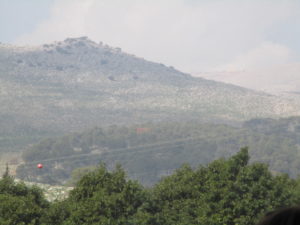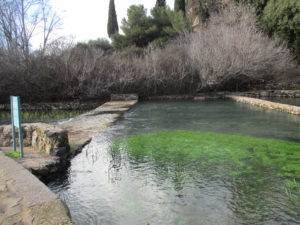Aug 23 | “Who do you say I am?”, (Sermon, August 23rd 2020)
Now when Jesus came into the district of Caesarea Philippi, he asked his disciples, ‘Who do people say that the Son of Man is?’ 14And they said, ‘Some say John the Baptist, but others Elijah, and still others Jeremiah or one of the prophets.’ 15He said to them, ‘But who do you say that I am?’ 16Simon Peter answered, ‘You are the Messiah, the Son of the living God.’ 17And Jesus answered him, ‘Blessed are you, Simon son of Jonah! For flesh and blood has not revealed this to you, but my Father in heaven. 18And I tell you, you are Peter, and on this rock I will build my church, and the gates of Hades will not prevail against it. 19I will give you the keys of the kingdom of heaven, and whatever you bind on earth will be bound in heaven, and whatever you loose on earth will be loosed in heaven.’ 20Then he sternly ordered the disciples not to tell anyone that he was the Messiah.
Matthew 16:13-20
“Now when Jesus came into the district of Caesarea Philippi, he asked his disciples, ‘Who do people say that the Son of Man is?’â€
In 2017 I was privileged to travel to the Holy Land for a course at St. George’s College in East Jerusalem. We visited many sacred sites, including some which normal tourists wouldn’t be allowed to visit.
The Holy Land is a strange place. In the Old City, among the cramped cobbled streets and the rush of pilgrims, the eyes are dazzled by colourful scarves and the shine of gold and silver plating on cheap rosaries. The ears are flooded with the shouts of merchants and their crackly radios. The nose picks up the smell of spices, incense, and ancient dust. But alongside these, more primitive senses also become engaged. The hairs on the back of your neck dance like aquatic weeds in a swift-running current of watchfulness that hangs heavy over the region. For thousands of years it has had more than its share of bloodshed, and the body knows, even if you’ve never been there or any place like it before. You can feel it.
Driving through the Golan Heights one afternoon on our large tour bus, we were cautioned to stay on marked footpaths to keep safe from unexploded bombs and mines littering the landscape. “If you see any fences,†warned our guide, “don’t cross them. It’s a one-way ticket.†The green hills, spotted with cattle and stone bunkers, loomed over us as we drove, hearts alert and thrumming.

But in Banias, nestled in the area once known as Caesarea Philippi where our bus stopped, things appeared peaceful. People hiked trails, birds sang, and the Jordan River, January-strong, roared alongside us as we passed under a Roman bridge. The hills which slope beside Mount Hermon enfolded us like loving arms. Near an abandoned hydro-electric mill, an old man sold warm pita out of a hut for a few dollars. At my request, he slathered it with chocolate and honey before rolling it up like a papyrus scroll and passing it to me.
We walked through the reddish-brown ruins of King Agrippa II’s palace, past a few weathered stones that remained of a Byzantine chapel, up to the source of the spring, an ancient grotto once dedicated to the god Pan. Here the Jordan flows much cleaner and sweeter than the brown and muddy baptismal site we visited earlier in the week.
We sat on the pavement just below the grotto to listen to a reflection from the dean of the college, Greg. The sky was blue, populated with only a few fat clouds – not quite warm enough to go without a jacket, but close. We sat back and closed our eyes as Greg murmured, “Now when Jesus came into the district of Caesarea Philippi, he asked his disciples, ‘Who do people say that the Son of Man is?’ And they said, ‘Some say John the Baptist, but others Elijah, and still others Jeremiah or one of the prophets.’ He said to them, ‘But who do you say that I am?’â€

We all considered the question in silence.
For me, in some ways, that silence has never ended.
“Who do you say that I am?â€
I think few of us have been tested in our faith the way we’ve been tested over the last four months. We’ve lost loved ones, or suffered from job loss, anxiety, or loneliness. We’ve had to handle medical problems during a time of stress on hospitals and specialists. We’re touch-starved and weary of our hypervigilance when we venture out to get groceries, or check in on friends and family. In the world around us, the excesses, limitations, and injustices of our systems of care for the poorest among us have been made crystal clear. And yet so much of the difficulty has been held beneath the surface. We may be stuck sitting quietly at home…but on the inside, we’re thrumming like power lines.
In the time of Joseph, the Israelites felt that the promise made to Abraham had finally come true. They’d been saved from famine and lived peaceful lives. Then, one day, the balance of power shifted. A leader arises who does not know Joseph, their patriarch and protector. Looking at the Israelites, he doesn’t see fellow community members or friends.
Who does God say that they are? Blessed, numerous as the sands of the desert and the stars of the sky.
But who does the oppressor say that they are? A drain on resources. Animals, only good for labour and degradation. An Other.
The oppressor does his best to try to make this true. The Israelites are enslaved. And yet – God’s truth is the one that rises to the top. They continue to thrive.
The oppressor is enraged. He lays plans for genocide, and, like all of genocide’s most cunning architects, he attempts to enlist the help of the oppressed in their own destruction, by demanding that the midwives Shiphrah and Puah kill all of the male babies born to the Israelites.
But again, God’s truth is the one that prevails – not because God personally intervenes, but because Shiphrah and Puah, two of the greatest heroes of the Hebrew Bible, see God’s truth. Not because they’re particularly cunning or righteous, but because they look at what’s going on and decide they’re going to be on God’s side.
At some point, both were caught up short by the wonder and fury of God’s love for the oppressed and broken, and in that burning moment, God turned to them and asked, “Who do you say that I am?â€
What would they have said? “The guardian of our people, the source of life, the one who rose up our father Jacob and his son Joseph, the trickster and the dreamer.â€
In Caesarea Philippi, standing by the brook flowing out from the grotto of Pan, a relic of the state religion looming over colonized Israel, Jesus asks his friends, “Who do you say that I am?â€
He knows what the religious authorities say. In the last few chapters he’s been fighting with them. They think he’s a rabble-rouser at best, someone who could bring down the wrath of the Empire on their people and therefore must be done away with.
But Jesus wants to know what the downtrodden, the illiterate, the workers, the Empire’s rejects think.
Once again, today as in first century Caesarea Philippi, God turns to us and asks, “Who do you say that I am?â€
Peter, who for all his impulsiveness really does seem to get it this time, says, “You are the Anointed One.â€
After all of the criticism of the religious authorities in their verbal
sparring matches with Jesus, it must have been confusing for the disciples. Who
should they listen to? The religious authorities, who helped them live their
faith in a colonized land that was hostile to them? Or Jesus, the rabble-rouser
who pushed them to welcome everyone, regardless of their past or
ethnicity or gender?
Peter throws in his cards with Jesus. Standing in Caesarea Philippi, by the peaceful shores of the Jordan, Peter takes a chance. Perhaps he recognizes that the peace of these shores is deceptive. Perhaps, like me, he felt the weight of the warning in his heart as he passed through those soft Golan hills that hold secret bombs. Perhaps, like all of us, he started to see the cracks in the foundation of our so-called perfect society, and decided it was better to live in God’s shadow than the Emperor’s, even if the Emperor’s appeared safer, because that safety was false.
Peter’s all in, so he drops his own bomb, and shatters the illusion of peace.
“You, the rabble-rouser, the so-called glutton and drunkard, the boundary-breaker, the teacher, the wild-eyed lover – you are the Messiah.â€
He steps into God’s shadow, and receives the keys to a kingdom just beginning to be born, just beginning to crown.
Today, God turns to us in a time of struggle, exhaustion, and maybe, if we’re willing to be reckless, labour pains.
Jesus, with the face of a worker, a protestor, a nurse, a patient, turns to us, and speaks, over the inner thrumming of our anxiety; the outer roar of an uprising; even over the rasp of a ventilator, reminding us of all we fear.
“Who do you say that I am?â€